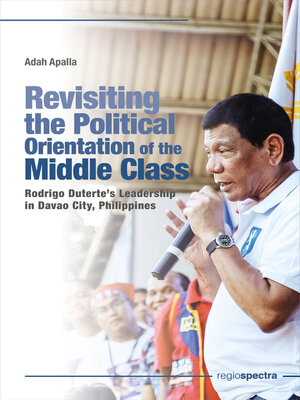Revisiting the Political Orientation of the Middle Class
ebook ∣ Rodrigo Duterte's Leadership in Davao City, Philippines
By Adah Apalla

Sign up to save your library
With an OverDrive account, you can save your favorite libraries for at-a-glance information about availability. Find out more about OverDrive accounts.
Find this title in Libby, the library reading app by OverDrive.



Search for a digital library with this title
Title found at these libraries:
| Library Name | Distance |
|---|---|
| Loading... |
Against the backdrop of the successful democratic movements in the Philippines in 1986 (against Marcos) and 2001 (against Estrada), the support of the middle class for Duterte's strongman leadership, characterized by political intimidations and alleged human rights violations, requires an in-depth analysis and empirical underpinning. This book, therefore, focuses on the middle class's support towards Duterte during his early political life in Davao City, where he initiated unique social programs that benefit not only the poor but also the middle class. The narratives provided by the respondents of the study suggest perspectives relating to prominent "Asian Values" features, such as familism, communalism and the preference for strong leadership. Davao appears to constitute an in-group or the self-styled law-abiding residents and an out-group or the suspected criminals and drug personalities who are perceived to be a threat to the in-group's constructed exclusive community. The support of the middle class for Duterte's leadership can be understood in the context of a constructed exclusive society of self-styled law-abiding citizens whose protection depends mainly on Duterte's ability to provide security through his war against drugs and crimes, which hints at a possible recurrence of "Asian Values."







